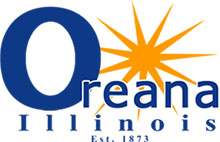Recent news and happenings around town
As we wrap up another winter and start moving toward spring, I wanted to share a few updates from the Village of Oreana. First, the Special Events Committee is planning another Easter Egg Hunt. The tentative date for this year’s event is April 13th. We are in need of candy donations for this event. We will announce drop off locations for the donated candy soon! The Special Events Committee is also in need of volunteers that are willing to not only help with future events, but also help with the planning. We all very much enjoyed the recent Christmas Parade and Reindeer in the Park, but these events will not happen in the future without more volunteers. Please contact me, and a committee member if you would be willing to help!
There have been some questions regarding utility billing. We are now able to accept payments online at oreanail.com. The first time you sign on to your account, you will need to sign up for an account. The fee for online payments is $3.00 per every hundred dollars of your payment. This fee is charged by the service provider, not the Village. There are also multiple free options to pay your bill. Most banks offer online bill pay for free, and you can still deposit a check in the drop box at the community building, or mail a check to the Village Office. We also offer auto-debit for free. This service automatically debits your bank account on the payment due date every month. To sign up for this, fill out and submit a direct-debit form. The forms can be found at oreanail.com
For all the golf-cart owners out there, please remember March is the month the golf-cart stickers need to be renewed. We will send a reminder by mail to renew your golf cart permit. If you do not receive a reminder by the end of March, please contact us to renew.
As a reminder, the Village Board meets at 6:00 pm on the third Tuesday of the month. We always offer a time for public comment at each of our meetings. Please feel free to visit one of our upcoming meetings, or contact me at mayor@oreanail.com or 468-2476 with any questions.
Thank you,
Mayor Aaron Keathley
Christmas Parade Info
Here are some highlights for the big event:
Parade will kick-off at 4:30 PM. Route will be similar to last year – starting at South View and Westmoor, continuing North on S. View, around View Circle, and North on S. View to South Street (Co 20). The parade will then move West, to Rayjon and end on Westmoor. (See Route Map Below)

Parking:
Parking will be permitted at the Argenta-Oreana Elementary School. A shuttle van will assist those that need assistance. The Oreana Christian Church has also agreed to allow parking in their lot anytime after 3:00pm.
There will be some parking restrictions on the parade route. There will be highly visible signs posted along the route where parking is not allowed. Street parking is allowed except as posted.
Street Closures:
South View will be closed starting at 3:30 pm on December 8th. The parade route will be closed to all traffic (other than emergencies) once the parade starts. Traffic will be allowed to proceed once the parade ends.
2018 Oreana Christmas Festival
The Village of Oreana 2018 Christmas Festival is coming up….December 7th and 8th. For more information, please click here.
Water Rate Increase
Over the past year, the Village of Oreana has been reviewing water revenue as compared to the cost of purchasing and distributing water. At the June 19th Village Board Meeting, the Village Board approved new water rates that are expected to generate the revenue needed to operate the water distribution system. This rate increase will only affect users with over 2,000 gallons of usage per month. The base rate of $21.86 will remain the same and will include the first 2,000 gallons of water. The price for each additional thousand gallons of water is $10.00. The sewer rates will remain the same this year. All rates (water and sewer) will continue to be automatically increased by 3% each June, which has been the case since 2014.
2018 Village Board Meeting Schedule
The Village Board has approved the 2018 regular meeting schedule. Regular meetings will take place on the 3rd Tuesday of the month, at 6:00pm. The Village Website event calendar has been updated with the meeting schedule.
Water and Sewer Rate Study Report
The Village of Oreana has recently conducted a water and sewer rate study. The results of this study will be used to determine water and sewer rates for 2018 and beyond. The report is available for viewing by clicking the link below.

